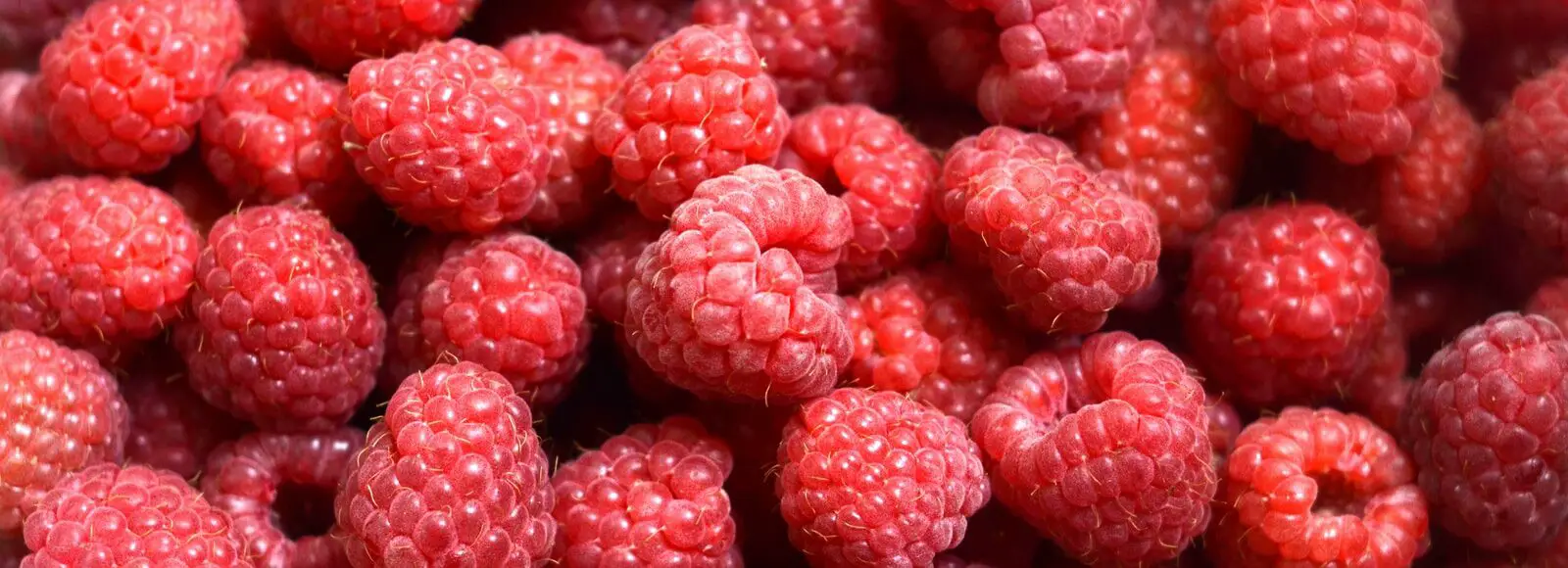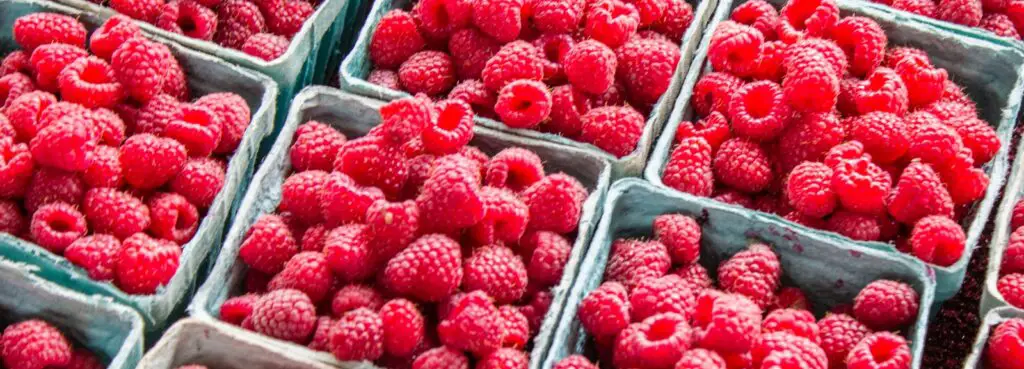
Key points
- Raspberries are not dangerous for cats if you stick to giving your cat the minimum recommended amount. Cats’ bodies weren’t designed to digest fiber, and therefore, eating too many high-fiber foods such as raspberries will lead to an upset stomach, dehydration, diarrhea, vomiting, and bloating.
- Raspberries have a lot of health benefits, including boosting the immune system, managing diabetes, slowing down the aging process, preventing cancer and degenerative diseases, and improving cognition.
- You can give raspberries to your cat fresh or frozen as a snack. The recommended maximum amount is 1-2 raspberries once or twice a week.
- Don’t give your cats raspberry-flavored yogurt, raspberry jam, and raspberry ice cream because these can be dangerous to your cat.
It’s hard to say “no” to your cat if you’re eating something tasty and the pet wants to try it, especially when you’re eating a bowl of fresh fruits and berries that don’t look like they can be harmful to your pet at all. But be mindful and remember that humans are built differently from cats. While most fruits and vegetables are okay for you to share, there are certain foods that you should keep as far away as possible from your cat because ingesting them even in small amounts can be fatal for the pet.

Speaking of raspberries, they are not dangerous for cats (which is a relief), but they are not very good either. Cats are carnivores by nature, meaning that they need a high protein intake, and their nutritional requirements should be reached mostly through consuming meat. Cats process fruits and vegetables much slower than humans, and that’s why you should give these foods in moderate amounts. Even if a particular fruit doesn’t pose any danger to your cat, you shouldn’t include it in your cat’s diet on a regular basis. Regular raspberry consumption can disrupt your cat’s digestive system and cause minor problems such as upset stomach and diarrhea.
Table of Contents
What Are The Benefits Of Eating Raspberries?
Raspberries come from the same family as other berries, and they are high in natural antioxidants. Raspberries are rich in minerals such as calcium, manganese, and potassium, as well as vitamin A, vitamin C, and dietary fiber. There are several reasons why humans add raspberries to their diet:
- Raspberries help to boost the immune system and fight against various diseases, including cancer. A single cup of raspberries provides more than 50% of the daily recommended amount of vitamin C for humans.
- Raspberries relieve nausea and reduce the risk of macular degeneration.
- They improve heart health and help manage diabetes by lowering insulin levels.
- It’s believed that raspberries are beneficial for weight loss and obesity, as they are classified among the fruits lowest in sugar.
- Raspberries are full of fiber, and one cup of this fruit contains about 8 grams of dietary fiber. The insoluble fiber in raspberries creates a sense of fullness which decreases the risk of obesity.
- Raspberries are packed with antioxidants, which help to prevent oxidative stress. Oxidative stress occurs when there is an imbalance between antioxidants and free radicals in a cell. When the amount of antioxidants is much lower than the amount of free radicals in a cell, free radicals will damage the cell’s DNA, giving rise to various conditions such as cancer. Raspberries not only stop the proliferation of cancerous cells, but they also contain compounds such as ellagitannins, which help to kill cancerous cells.
- Raspberries help prevent arthritis and contribute to general bone health.
- Raspberries slow down the aging process by preventing different infections, such as diabetes, heart disease, and cancer. It’s worth mentioning that antioxidants in raspberries ease skin inflammation and scarring.
- Studies have proven that raspberries reduce stress-related disorders such as hypertension and anxiety in humans and help with cognitive function and brainpower in general due to the flavonoids they contain.
It’s most common to eat raspberries when they are fresh, but you can also serve them frozen, making them a great summer snack.
How Many Raspberries Can I Give My Cat?
 You should avoid giving your cat too many raspberries at a time. The fact that raspberries are not toxic for cats doesn’t mean that you should go overboard with them. Eating too much of one product is bad for cats, just like it is for humans.
You should avoid giving your cat too many raspberries at a time. The fact that raspberries are not toxic for cats doesn’t mean that you should go overboard with them. Eating too much of one product is bad for cats, just like it is for humans.
The maximum amount of raspberries you can give to your cat is only 1-2 berries once or twice a week and only occasionally. Allowing your cat to ingest more can have unpleasant consequences because of the amount of xylitol that is present in raspberries.
Xylitol is a common sugar substitute. It can be toxic to animals, and that’s why it’s not recommended for them to consume it in large amounts. Consuming too much xylitol can significantly increase blood sugar levels, which is especially dangerous for cats with diabetes.
You can check if your cat is allergic or intolerant to raspberries by giving half a raspberry and then watching the pet’s reaction. If your cat is allergic to these berries, it might experience improper bowel movements, bloat, or pass gas.
Side Effects Of Raspberries For Cats
If your cat eats more than the recommended amount of raspberries at once, it might experience diarrhea, abdominal pain, dehydration (evidenced by extremely dry stool), skin irritation, upset stomach, which includes bloating, gas, acid reflux, and foul-smelling fecal matter, kidney toxicity, and even kidney damage. If you see any of these signs, take your cat to the vet immediately, and don’t wait for the problem to go away by itself.
Don’t give raspberries to kittens and cats that suffer from gastrointestinal problems since their stomachs are much more sensitive.
How To Give Raspberries To Cats?
You can introduce raspberries to your cat by giving them whole, pureed, or frozen. The main rules are to thoroughly wash the berries before feeding them to your pet and sticking to the recommended portion. Also, don’t leave raspberries lying around in the area where your cat can reach them because their color and strong scent will definitely make your cat curious enough to try them.
Can Cats Have Raspberry Flavored Products?
Raspberry Flavored Yogurt
 Yogurt is often considered a healthy food with many benefits, but your cat will most likely prefer plain yogurt over flavored one since cats are not fans of artificial sweets. But you can give it a try anyway to see whether your feline likes raspberry yogurt. And what if it does?
Yogurt is often considered a healthy food with many benefits, but your cat will most likely prefer plain yogurt over flavored one since cats are not fans of artificial sweets. But you can give it a try anyway to see whether your feline likes raspberry yogurt. And what if it does?
If you see that your cat enjoys raspberry-flavored yogurt, then limit its consumption to a minimum. Your cat may love raspberries and raspberry-flavored yogurt, but loving something and being able to safely digest it are two different things, so keep that in mind.

Raspberry Jam
Cats definitely should not eat raspberry jam because of the high amount of added sugars that it contains. The product may also be full of artificial flavors, which should not be a part of your feline’s diet.
Raspberry Ice Cream
Just like jam, ice cream is full of sugars and flavorings that can be poisonous for cats. It also contains a lot of milk, and cats are highly intolerant to lactose. Plus, frozen chunks of ice cream are a potential choking hazard for your cat.

Raspberry Leaves
Although raspberries are safe when fed in moderate amounts, you should avoid leaving raspberry leaves where your cat might access them since they can be toxic and contain residue from pesticides and plant parasites. If your can ingests raspberry leaves, it will experience nausea and vomiting.
What Fruits And Veggies Can I Give My Cat?
If you are wondering what else you can share with your cat besides raspberries, then here’s a list of cat-friendly fruits and vegetables that both you and your cat can enjoy together:
Fruits To Share With Your Cat:
- Cantaloupe
- Blueberries
- Strawberries
- Peaches
- Watermelon
- Bananas
Vegetables To Share With Your Cat:
- Asparagus
- Broccoli
- Celery
- Carrots
- Cucumber
- Zucchini
- Green Bell Pepper
What Foods Are Dangerous For Cats?
While we’ve covered all the products you can safely share with your cat above, here’s a quick reminder of foods you should never give your cat or leave somewhere your cat might reach them. These products can be toxic and even lead to death.
- Alcohol
- Caffeine
- Fat trimmings
- Raisins
- Bread dough
- Chocolate
- Grapes
- Nuts
- Garlic
- Onions
- Xylitol contained in gum and candy
FAQ
Are berries safe for cats?
Yes, blueberries, raspberries, blackberries, and cranberries are safe for cats when consumed in moderate amounts.
How many raspberries can cats eat?
The recommended portion of raspberries for cats is 1-2 berries once or twice a week.
Is it dangerous for cats to eat raspberries?
Eating too many raspberries can result in your feline suffering from an upset stomach, nausea, dehydration, skin irritation, and kidney damage.
What kind of fruit can cats eat?
Cats can eat apples, blueberries, bananas, seedless watermelons, and strawberries.




